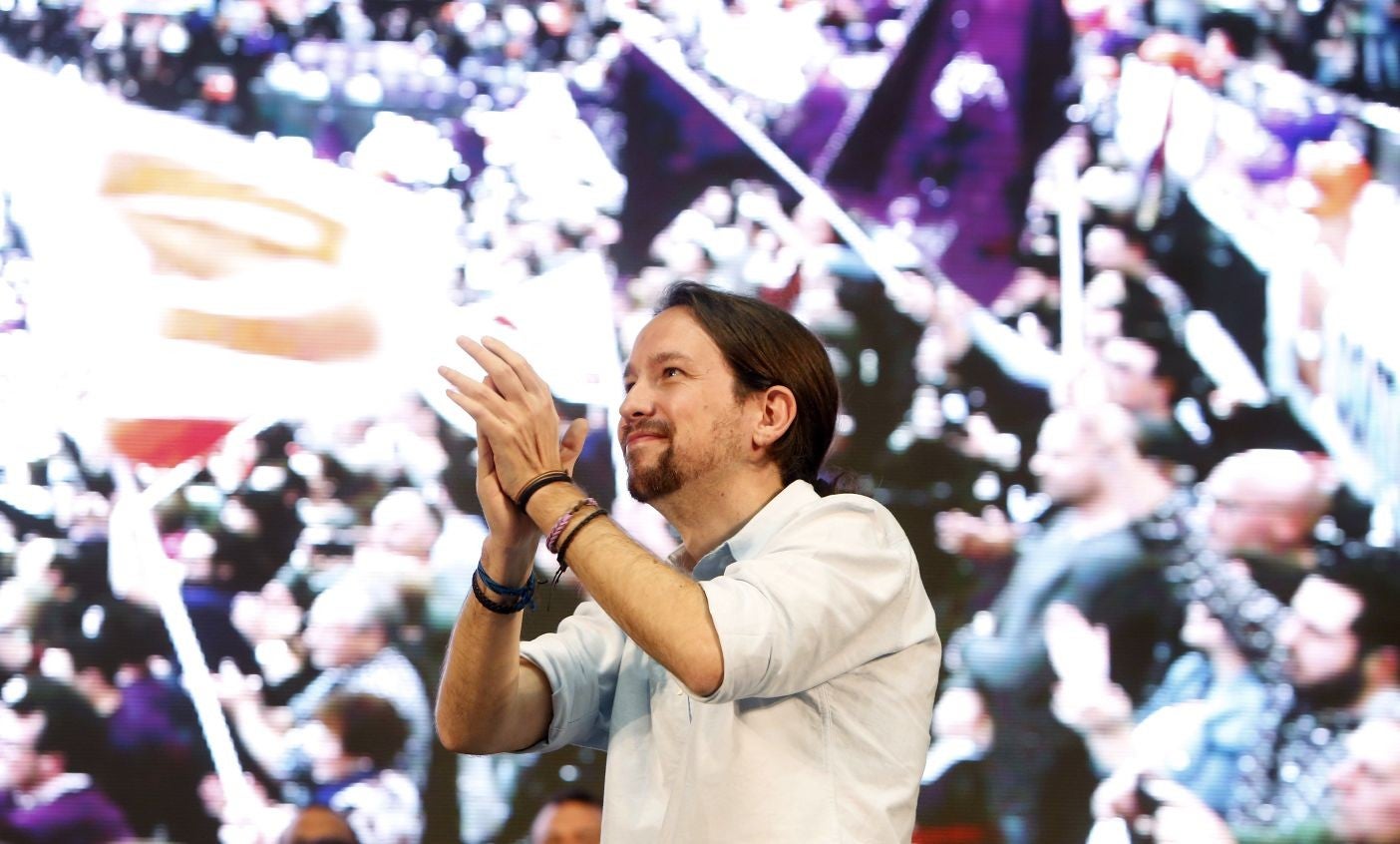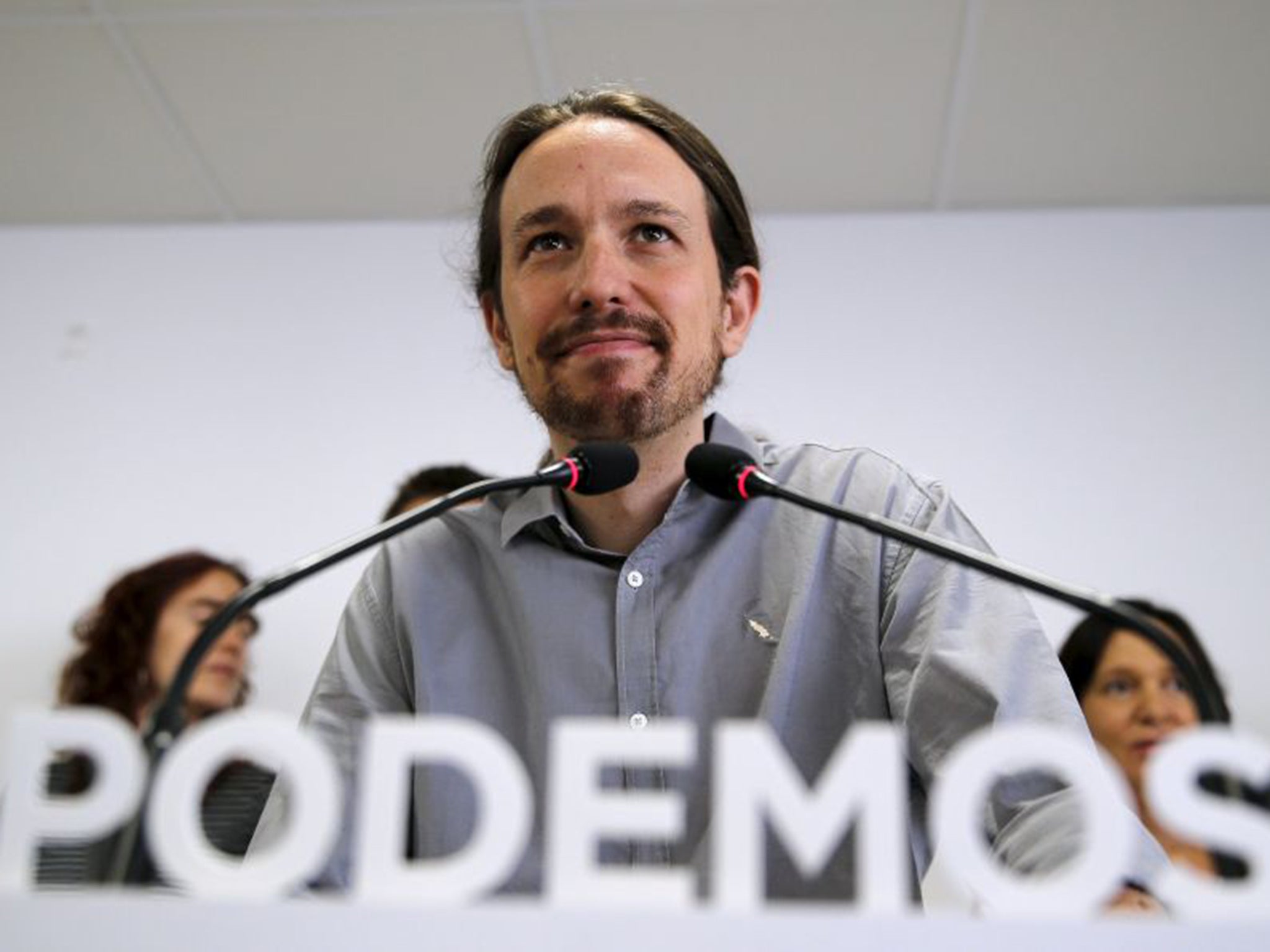Pablo Iglesias: How the leader of the leftist Podemos party upset Spain's elites to reach the brink of power
At a Podemos rally it is easy to see why Mr Iglesias wins votes – he speaks brilliantly, and has a memorable turn of phrase

The brief meeting in April between Pablo Iglesias, leader of Podemos – the insurgent force in Spanish politics – and King Felipe, the country’s youthful king, was always going to create headlines. It came a little more than 18 months after the formation of the leftist party which surged in opinion polls after Iglesias and his colleagues called for a “new Spain”.
Felipe, scion of the House of Bourbon, was the very incarnation of old Spain. The Podemos leader, tieless and with his long hair tied back in his trademark ponytail, presented the king with a box set of his favourite television series, Game of Thrones, so the monarch “would understand the key points of the political crisis in Spain”. If the king’s grin masked a little nervousness at meeting the man who would go on to turn Spanish politics on its head, he need not have worried. It has never been Felipe’s throne that has particularly interested Iglesias; his scheming, plotting and calculated political manoeuvres have always had a different target in mind.
A couple of months earlier, Podemos held its biggest rally to date, packing upwards of a million people into central Madrid’s Puerta del Sol. The slogan for the event was “tick, tock” and the message behind it was clear: winter was coming for Spain’s political establishment, and its time was running out.
Last Sunday, the 37-year-old former politics lecturer delivered on his promise. Not only did Podemos take a fifth of the vote despite never before having contested a general election, it also blew apart the cosy arrangement that has existed in Spain since the return to democracy in the late 1970s, which has allowed the right-wing Popular Party (PP) and the leftist Socialist Workers Party (PSOE) to swap power on regular occasions.
Thanks to Iglesias, neither party can now govern alone. If the two traditional parties can reach an agreement – and that is by no means likely – Podemos will emerge as the main opposition group in Spain. If a grand coalition does not work, there is a good chance Podemos, and Iglesias, will enter government as part of a leftist alliance. Either way, the man has already won, for he has changed Spain for good.

At the start of 2011, Iglesias – then a left-wing academic at Madrid’s prestigious Complutense University – was already a household name, having appeared on political TV shows in which he criticised the then PSOE government’s handling of the economic downturn. Being subjected to demands for ever greater austerity from Brussels was undemocratic, he argued. It was the EU that was becoming the ruler of Spain, not the elected government. As the markets risked pushing Spain to bankruptcy, he tapped into the public feeling. “When Podemos is in government, JP Morgan is not going to be able to pick up the phone and tell us what to do,” he told the Cuarto TV station last year. “The people vote for governments, not investment banks.”
If he owes his political rise to the Spanish government’s reaction to the financial crisis that scarred the country so badly, left-wing activism is in his blood. Both his parents were active in leftist politics. His mother, Luisa Turrion, was a lawyer and activist with the CCOO, Spain’s largest trade union, which has links to PSOE. His father, Javier, was a history lecturer who became a member of the banned anti-fascist front in the 1970s. His paternal grandfather, Manuel, also an anti-fascist activist, was sentenced to death after the Spanish Civil War in 1939 for his role in intelligence activities against Franco’s forces. (The sentence was later commuted to 30 years in prison because of a lack of evidence.)
Pablo Iglesias gave up a promising career as an academic lawyer to concentrate on politics. He is even named after one of Spain’s foremost socialist thinkers: Paulino Iglesias Posse, better known as Pablo, died in 1925, but not before he had founded PSOE. He was regarded as the father of Spanish socialism and, not surprisingly, many of his works were banned under Franco’s fascist dictatorship.
Unlike other armchair commentators, the modern day Iglesias decided to play a role himself. In 2011 he became a key member of the 15-M movement, which took to the streets of 58 Spanish cities on 15 May 2011 to demand an end to rising unemployment, spending cuts and home repossessions. By the end of that year, the right-wing PP replaced a hopelessly adrift PSOE. Rather than listen to the demands of the estimated 6.5 million people who had taken part in 15-M demonstrations, PP did the opposite, making savage cuts to health and education as well as other public services. Home repossession soared, a particular sore point since the Spanish banks that were calling in loans had been bailed out to the tune of €41.3bn (£30bn) of European taxpayers’ money. Unemployment – one cost of a raft of liberal labour reforms – rose to more than 26 per cent.
It was in this atmosphere that Iglesias founded Podemos at the start of 2014. It had no money and no big financial backers – but it did have the brilliantly organised Iglesias. Within months, the protest movement-turned-political party won almost 8 per cent of the national vote in European elections. Iglesias and four of his colleagues were elected to the European parliament.
Taking a leaf out of the campaigning book of Barack Obama, Iglesias has eschewed traditional politics. His party makes announcements using the WhatsApp messaging app, and his rallies – at which thousands are always guaranteed to attend – start with the theme from Ghostbusters. It is followed by the now familiar chant of, “Si, se puede”, “yes, we can”.
Last Saturday, the day before the election, parties were banned from campaigning. The other party leaders took to social media and tried desperately to show themselves in relaxed and confident mood. Iglesias trumped them all by going to watch the new Star Wars movie.
It has not all been that easy. The right-wing press has jumped on his stated admiration for Venezuela’s former president, Hugo Chavez, and accused him of wanting to replicate the South American state.

As well as Spain’s economic problems, the Podemos leader has bitterly attacked corruption, which has engulfed PP. That was made difficult when one of his key lieutenants was accused of accepting a political donation from the Venezuelan government – an allegation that has been denied.
Even when Podemos’s local alliances won municipal elections in Madrid and Barcelona in May, critics said PP’s vote would return for the general election. But go to a Podemos rally and it is easy to see why Mr Iglesias wins votes. He speaks brilliantly, and has a turn of phrase that is memorable.
He attracts young and old alike. Speaking on election day, Lourdes Morcsende, 28, a primary school teacher, said the time had come for Podemos to be offered the chance to govern: “The country is looking for something new. Things have to change. We are all sick of the old ways.” Iglesias could have written that quote for her. He now has his chance to present that new way. Moving from protest to power is never easy, but Iglesias has already broken 40 years of Spanish history in less than two.
Join our commenting forum
Join thought-provoking conversations, follow other Independent readers and see their replies
Comments